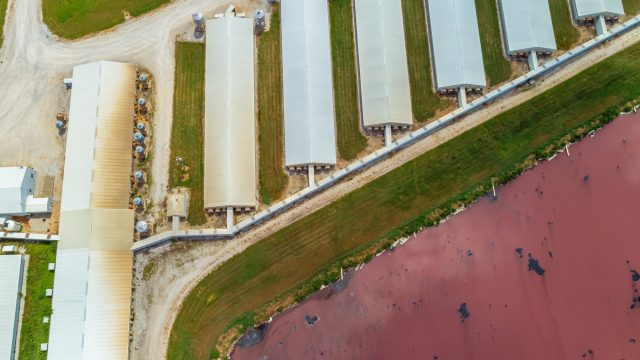
Tara Zuardo
 It was a victory for ALDF’s fight to protect wildlife from the cruel practice of “penning,” in which wild foxes and coyotes are captured, “penned” in caged enclosures, and torn to shreds by packs of hounds as hunting practice.
It was a victory for ALDF’s fight to protect wildlife from the cruel practice of “penning,” in which wild foxes and coyotes are captured, “penned” in caged enclosures, and torn to shreds by packs of hounds as hunting practice.
On December 5th, ALDF received a default ruling in our lawsuit against the Indiana Department of Natural Resources (DNR) for waiving state permit requirements for controversial penning facilities like WCI Foxhound Training Preserve. The judge signed ALDF’s proposed judgment without changes, including declaring WCI’s possession of coyotes without a permit to be unlawful. While the verdict is an important victory over WCI, DNR has not yet indicated whether it will enforce permitting laws against the illegal penning operation. If DNR refuses to do so, ALDF will seek a court order requiring enforcement of the law.
Using the law to protect animals is a driving force in Tara Zuardo’s work, including her assistance in the penning case working with ALDF attorney John Melia. Tara is a Wildlife Legal Associate at the Animal Welfare Institute, where she specializes in international and domestic wildlife law and environmental law, and knows that using state laws can help protect wildlife. “Often when it comes to wildlife that isn’t endangered, your only tool is to use state administrative law,” she says. “It’s very helpful to have ALDF when you want to challenge state issues. Just look at the ‘Snapperfest’ issue and our penning case.”
Tara connected with ALDF on the penning case through Camilla Fox (who runs Project Coyote). The case was filed jointly with Project Coyote and AWI, with pro bono assistance from the law offices of Lawrence Reuben, against the Indiana Department of Natural Resources (DNR), for failing to require WCI to obtain permits for wild animals in its possession outside of hunting season. State administrative laws are an important way for advocates to protect wildlife, as was the case in AWI’s recent important victory stopping the spotlight hunting of coyotes after a fourth endangered red wolf was killed. Unfortunately, Tara explains, state organizations rely on hunting for their income. This leads to conflicts of interest and motivation to allow as much hunting and deregulation as possible. “You have to use legal mechanisms strategically to protect wildlife because unless they’re endangered, they’re in trouble.”
A San Francisco Bay Area native, Tara has always been passionate about animal protection. She worked for the Audubon Society after receiving her bachelor’s degree with high honors from the University of California, Berkeley. As she helped negotiate with the Fish & Wildlife Service to convert a former naval base into a wildlife rescue, she realized she was going to need more tools if she was going to take it to the next level. And so she went to law school to help animals.
Because of its outstanding Animal Law program, Tara chose Lewis & Clark, and received a J.D. and certificate in Environmental and Natural Resources Law with an emphasis in Animal Law in May 2010. She quickly realized “wildlife” law is the foundation of many of our animal laws–as the Clean Air & Water Act can be extended to factory farms, or the Endangered Species Act can be applied to elephants in circuses. Beyond this, laws like the Animal Welfare Act (AWA) and the Humane Slaughter Act don’t have a lot of teeth–and we don’t have much else.
Tara highlights the power of Animal Law Conferences in her career. She worked with Liberty Mulkani on organizing the Lewis & Clark Animal Law Conference from 2007-2010. By her third year in law school, Tara (co-director of her SALDF chapter) helped organize panels and set up debates on the destruction of non-native animals. This topic is a common ground of contention between animal and environmental movements. Tara says “I don’t think people know how many non-native animals are destroyed and how violent it is.” There is no regulation on suffering.
And that is why animals need lawyers. Tara advises the next generation to get involved with pro bono work as soon as they can. As animal law is still a small field, the most important thing is “enthusiasm, experience, and dedication,” she says. “Start as early as possible.” Get hand’s-on experience. Plan strategically, make connections, and don’t underestimate the value of pro bono work in networking.
As she looks to the future, she hopes we are headed towards a place where animals are no longer property. “We weigh the existence of coyotes and deer with the existence of vegetation in national parks. We don’t give them any kind of sentient property status” Tara says. “If they had that sentient status, they would have more rights, and naturally be elevated in the law, as they should be.”
Tara’s impressive history includes working as the CA Director and Legal Coordinator of a wildlife program for Earth Island Institute, clerking for the Pacific Environmental Advocacy Center and for In Defense of Animals, serving as a legislative extern for the International Fund for Animal Welfare, and managing the Golden Gate Audubon Society. Her significant volunteer work comprises service for animal welfare and environmental groups like Pet and Wildlife Fund, Terwiliger WildCare Center, Save the Bay, and the Marine Mammal Center. Tara has also contributed invaluable pro bono legal work for ALDF and the Northwest Environmental Defense Center, and published an article entitled “Habitat-Based Conservation Legislation: A New Direction for Sea Turtle Conservation” in the Animal Law Review. She currently coordinates policy and legal reforms on wildlife conservation issues at the Animal Welfare Institute.
“It is inspiring to meet an individual like Tara,” says Pamela Hart, director of ALDF’s Animal Law Program. “It has been a pleasure to follow Tara’s trajectory from law student to outstanding legal professional.”
The Animal Legal Defense Fund would never be able to use the law to advance the interests of animals without the support of legal professionals nationwide. In this continuing series of spotlights, ALDF salutes attorney Tara Zuardo.
How We Work
Related
-
Court Rules Texas Food Label Censorship Law is Unconstitutional
The law imposed unclear and vague standards on plant-based meat producers that violate the First AmendmentJanuary 29, 2026 Press Release -
State Animal Protection Laws Ranked: Oregon is #1, North Dakota #50
20th edition of ALDF state and territory ranking report highlights major advancements & trends in animal protection across the U.S.January 27, 2026 News -
Over 30 Organizations Urge USDA to Limit Federal Support for Manure Digesters
Hundreds of millions of dollars intended to cut energy costs have been funneled to costly manure digesters, benefitting the largest factory farmsJanuary 15, 2026 News



